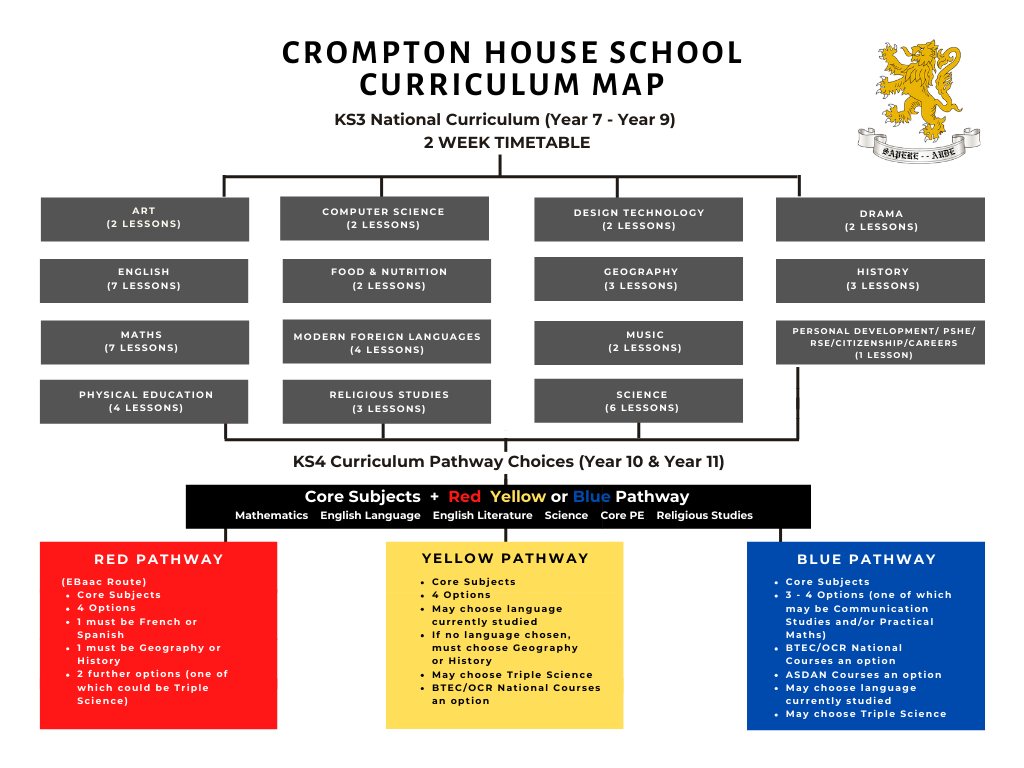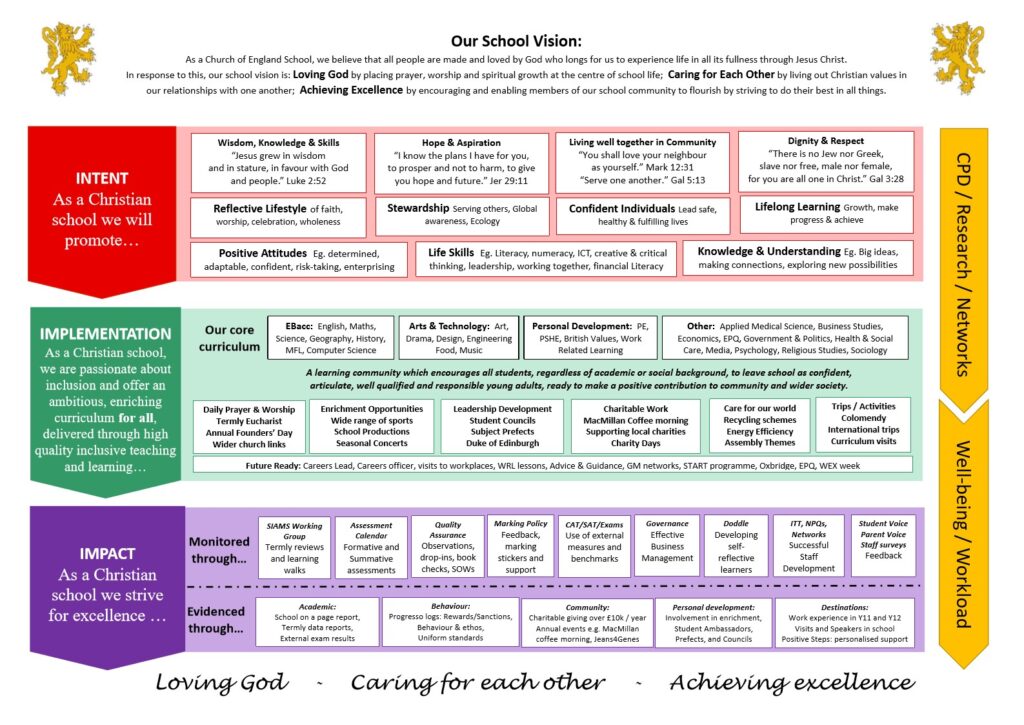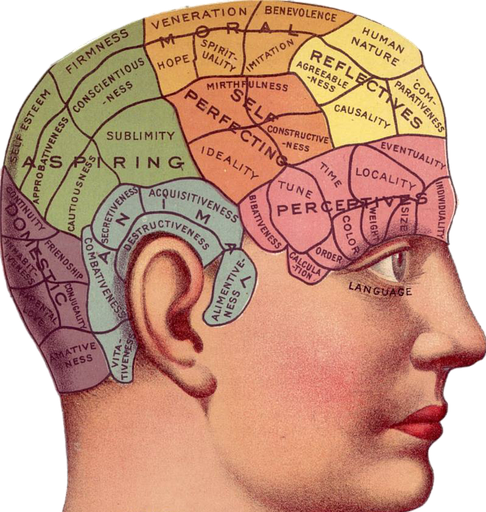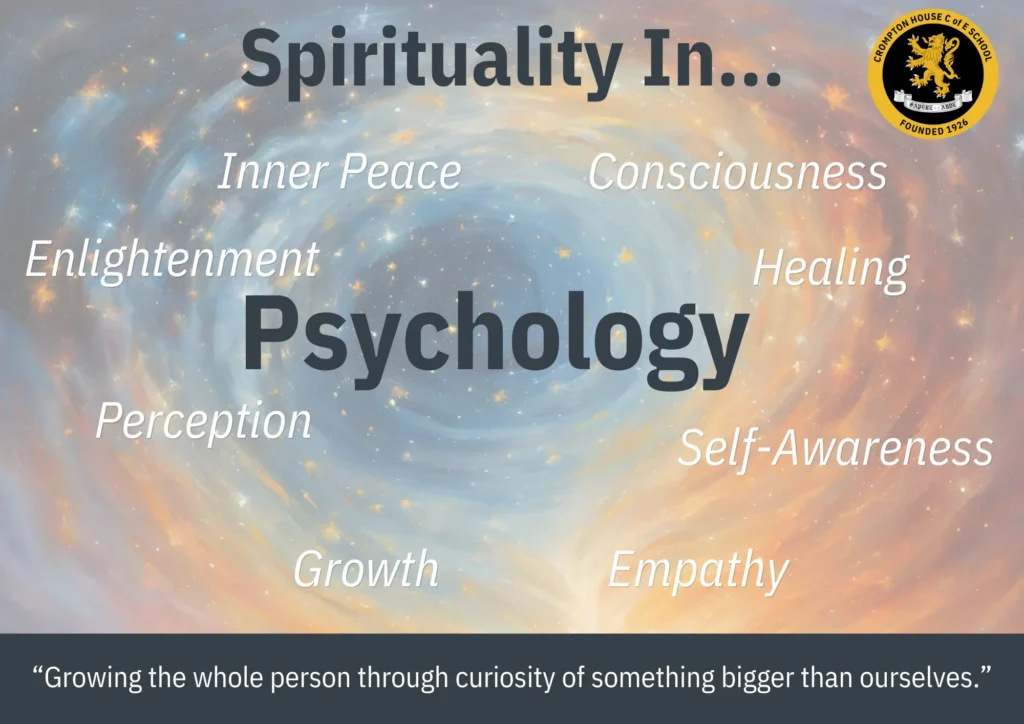Psychology
At Crompton House we aim to create the very best Psychology students. The aim of the Psychology curriculum is to equip students with the appropriate knowledge and skills needed to be able to understand and explain the causes of human behaviour and the impact of this behaviour on wider society. We do this using quality first teaching to ensure students understand underlying Psychological principles and can apply them in a variety of familiar and unfamiliar contexts. Psychology students are guided to be able to think analytically and reach logical conclusions based on scientific evidence.
Our curriculum goes beyond what is taught in lessons, for whilst we want students to achieve the very best examination results possible, we believe our Psychology curriculum goes beyond what is examinable.
Our curriculum in Psychology supports the ethos of the school. Students are constantly challenged to work collaboratively and think independently when engaging in all lessons and class debates. Through teacher modelling, we encourage students to demonstrate manners, respect and tolerance in Psychology lessons. This allows students to express themselves in a confident manner. Lesson materials are engaging to promote topical discussion and encourage students to develop an enquiring mind.
We believe that knowledge underpins and enables the application of skills; both are entwined. Content is delivered to students and then built upon through a variety of practice questions, with regular quality feedback being given to support student progress. The knowledge acquired then allows students to develop their analytical and critical thinking skills.
Cultural Capital is embedded throughout the Psychology curriculum. Our students are introduced to a wide variety of viewpoints from some of the most influential Psychologists throughout history such as Freud, Skinner, Bandura, Milgram, Zimbardo. Psychology students study the impact that their work has had on the world we live in and students are encouraged to make links between their studies and real – life examples. At A level, Psychology students are expected to analyse the relative contributions of competing theories in order to discuss their impact on our understanding of human behaviour and society as a whole.
In addition to our aims, our curriculum design includes revisiting and building on existing knowledge using metacognition tasks. We ensure the level of challenge is high enough for the most able, with scaffold and support available for students who need it.
Is there a vision for Psychology and how does it reflect and support the school context?
To create curiosity in the social world and an understanding of how our actions can shape our social environment, the behaviour of ourselves and others.
How clearly are the expectations and goals built into the curriculum?
Each module in all of Psychology carries its own objectives and aims as laid out in the Topic Stories. These aims are conveyed to students within each module so that they can see the end intentions of their learning.
How has curriculum content been selected and how does this reflect the vision?
Key stage 5 content in Psychology has been determined by the AQA exam board which is used across the department. This has been the result of investigation of the varying exam boards following new specifications.
The AQA specifications reflect our department vision strongly as students develop a clear in Psychology of approaches to understanding human behaviour
How does the curriculum develop understanding about key Psychological concepts?
Psychology is a new subject never studied before (except GCSE for some external candidates) begins with a core module of Research Methods and Approaches that include core social scientific concepts that are central to the A level course. Each of these core concepts is then explored in great depth over the next two years to ensure student comprehension and evaluation of them, preparing them for post-18 study or work.
For example, in Psychology students understand core approaches to human behaviour which are then repeatedly revisited throughout the course. Students will use this to create and carry out their own research in the mid-sixth form Summer break.
Collaborative, detailed and thorough curriculum planning lies at the heart of the department of work. We use all available resources and teaching strategies to ensure that students have a comprehensive knowledge of the specifications and are capable of going beyond what is taught in lessons. Techniques to help develop long-term memory and help students master subject content are embedded in the curriculum. These are focused on embedding challenge, metacognition, memory techniques, numeracy and literacy into our departmental curriculum.
To complement the schemes of work students also engage in Psychology through student revision conferences with senior examiners and other experienced practitioners. These activities allow students to gain valuable insight into the subject and the demands of the examination.
In Psychology we also implement our curriculum through using a variety of teaching strategies and kinaesthetic tasks as well as more traditional skills practice.
How good is teachers’ knowledge and knowledge of how Psychology is taught and learned?
Teacher knowledge is excellent; timetable usually allows for A levels to be taught by subject specialists with experience in their subject areas. The department contains teachers with several years’ experience in teaching all three A levels on offer. This is evidenced from lesson observations, lesson planning and by action in the classroom.
How well does teaching embed secure understanding and how does assessment support this?
Teaching & assessment at key stage 5 is focused on the examination requirements set by AQA, for example by embedding routine opportunities for exam practice and paragraph writing. The AQA exam structures are clearly designed for skill development in the field of evaluative thinking, comparison and essay-writing, to embed & secure skills as well as knowledge.
How do high-quality resources support learning?
Students in Psychology benefit from having to be plugged in to the real world of their subjects. Students in Psychology benefit from the use of subject booklets which are regularly updated to provide knowledge from exam series and exam marking to provide new, evidence & evaluation of theories.
Which teaching approaches work best in specific circumstances & why?
We use a variety of teaching approaches but our overall aim is to give students the knowledge, skills and abilities to understand and make informed decisions. In class, students use a range of learning styles including kinaesthetic card sorts, frequent self-research opportunities, application & evaluation tasks and skills tasks like essay-writing and comparative evaluation. In Psychology, students conduct their own research task in the mid-sixth form Summer break.
The curriculum within the Social Science department is highly effective, with examination results consistently above the national average and among the strongest at A Level. The quality of teaching and learning has been praised during learning walks by both internal and external observers. Student engagement is clearly evident in lessons and is regularly reflected in student voice feedback. The number of students opting to study Psychology at A Level remains exceptionally high, with many choosing to continue their studies in the subject at university. Most importantly, students frequently express their enjoyment of Psychology, praise the quality of teaching they have received, and value the knowledge and study skills gained through the department.
With subject specialists who possess experience of studying Psychology at university level, students are effectively taught the links between core theoretical learning in the sixth form and undergraduate study. The AQA A Level specifications provide an excellent foundation for university-level education. For example, in Psychology, students are taught to critically evaluate both theories and research studies, alongside designing and conducting their own research projects — skills that are essential for higher education and beyond.
Students are set ambitious, aspirational targets using ALPS 3 as the benchmark. Assessment is continuous, with key assessments taking place at the end of each topic. These outcomes are recorded in individual assessment books to track performance over time. Progress is formally reported during learning profile points, twice annually. Additionally, internal examinations are scheduled in June of Year 12, and in October and March of Year 13 to assess cumulative knowledge and ensure students are on track to meet their curriculum goals.






